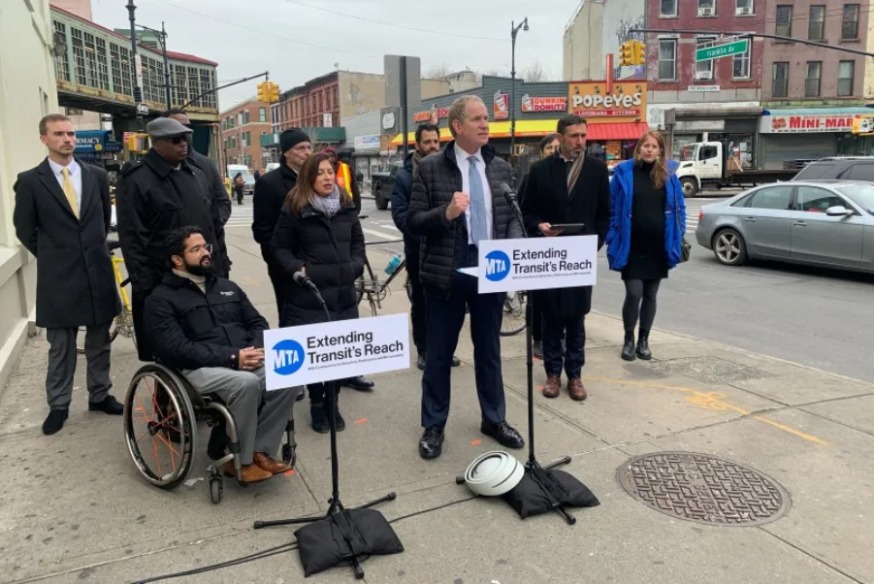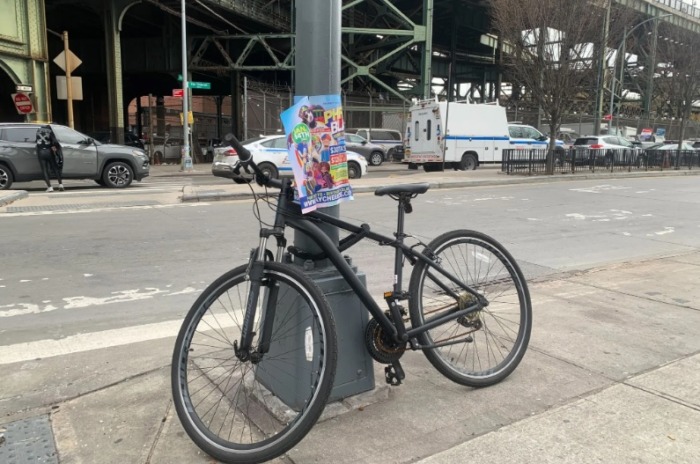
Outside the Franklin Avenue shuttle in Bed-Stuy, MTA Chairman Janno Lieber speaks about the agency’s plan to install new bike racks at 37 stations, Jan. 11, 2023.Jose Martinez/THE CITY

This article was originally published by The CITY on Jan. 11
The MTA and City Hall are shifting into gear on ways to better connect bicycles and other green forms of transportation to the subways, buses and bridges.
MTA officials on Wednesday unveiled “Extending Transit’s Reach,” the report from a yearlong study outlining plans for how the mass transit system can better accommodate the 1.9 million New Yorkers who get around on bicycles, as well as the growing number who use micromobility vehicles such as scooters and e-bikes.
The plan is part of what MTA officials described as a “real sea change” to put New York in the fast lane alongside other global cities through cyclist-friendly moves. Those include installing bicycle racks at 37 subway stations, building or widening bike paths on some bridges, and placing front-of-bus bike racks on the M60, S79 and Q44 Select Bus Service routes.
“We’re now developing policy that we can incorporate bikes and scooters into the planning for mass transit, for an integrated mass transit system,” said Janno Lieber, MTA chairperson and CEO. “That’s a shift — before, it was kind of fragmented, nobody at the MTA was charged with really thinking about it.”
THE CITY in 2021 highlighted how other transit systems in cities like London and Paris had far outpaced New York in making room for bicycles with secure or covered parking spaces. Closer to home, Jersey City has been working toward setting up a 30-station public bike parking system where cyclists can securely store their two-wheelers for free.
City Department of Transportation data shows that cycling in the city surged by more than 100% in the last decade, with 550,000 bike trips in 2021 — up from 270,000 in 2011.
The MTA and the city are now trying to play catch-up, with the transit agency last year installing a bicycle storage pod, from bike-parking startup Oonee, outside of Grand Central Terminal. That unit has room for six bikes and is part of a separate pilot program for the agency. The MTA also plans to expand bike parking at five Long Island Rail Road and 13 Metro-North stations.
“While the plan found that 87% of our [subway] stations have a rack within 400 feet, we want to improve that based on equity and demand considerations,” said Jamie Torres-Springer, president of MTA Construction and Development.
Sense of Security
The 37 subway stations that are set to get space for bikes are largely outside of Manhattan, with 19 in Brooklyn, nine in Queens and seven in The Bronx.
They include the Coney Island-Stillwell Avenue terminal and Broadway Junction in Brooklyn; Howard Beach-JFK Airport and Jackson Heights-Roosevelt Avenue in Queens; and East 180th Street and Baychester Avenue in The Bronx.
The one Manhattan station getting a new bike rack will be at 96th Street and Central Park West on the B/C line.

The MTA planned to add bike racks outside the Broadway Junction station — so bike owners don’t have to secure their ride this way — in Brooklyn, Jan. 11, 2023.Jose Martinez/THE CITY
At Broadway Junction, several bicycles were hitched to lamp posts not far from a Citibike docking station outside the transit hub.
“There’s not really a convenient place to put your private bike,” said Raheem Kareem, 28, who uses Citibike because it offers docking stations. “People just leave their bikes against the post and that might not always be safe.”
Danny Harris, the executive director of Transportation Alternatives, pointed to statistics showing that a quarter of New York households have had a bike stolen.
“By bringing … secure bike parking, it helps to ensure not only your ability to get there, but also your livelihood,” Harris said.
Lieber also acknowledged that the MTA is developing a policy to regulate the use of e-bikes and e-scooters in the subway and on the commuter railroads.
In August, THE CITY reported that the transit agency was exploring potential guidelines for the devices after fires caused by lithium-ion batteries surged citywide last year.
“What it’s definitely going to do is make sure there’s no charging and there are no vehicles that have combustible fuels,” Lieber said. “But other than that, we really want to do everything we can to encourage people to take advantage of the opportunity to bring a bike.”
THE CITY is an independent, nonprofit news outlet dedicated to hard-hitting reporting that serves the people of New York.
